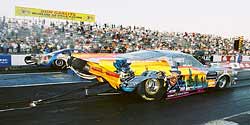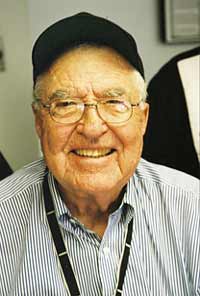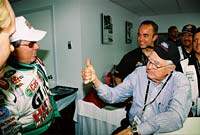|
Racing Icon,
Carroll Shelby's
Return to Drag Racing
by Susan Wade
Photos by Jeff Burk
4/8/04
 Editor's
Note: The reason that Carroll Shelby was at
Gainesville so that DRO senior writer Susan
Wade could do this interview was because Mike
Ashley, Doug Hasty - CEO of Unique Performance,
and his major sponsor, InfiNet's Richard Kearby,
got Mr Shelby back into drag racing by getting
him involved in their GT-500E "Eleanor" Mustang
program and the NHRA AMS Staff Leasing Pro Mod
Challenge series. Thanks to Ashley, Kearby,
their staffs, and Kenny Nowling for arranging
the time with Carroll Shelby. Editor's
Note: The reason that Carroll Shelby was at
Gainesville so that DRO senior writer Susan
Wade could do this interview was because Mike
Ashley, Doug Hasty - CEO of Unique Performance,
and his major sponsor, InfiNet's Richard Kearby,
got Mr Shelby back into drag racing by getting
him involved in their GT-500E "Eleanor" Mustang
program and the NHRA AMS Staff Leasing Pro Mod
Challenge series. Thanks to Ashley, Kearby,
their staffs, and Kenny Nowling for arranging
the time with Carroll Shelby.
 Carroll
Shelby is best known for his triumphs as an
owner/driver in sports car, Indy, and other
auto racing disciplines. However, he had a brief
stint in the 1967 drag racing season, where
he made a significant impact. As anyone in the
sport knows, a Shelby Ford Cobra is one of the
most powerful and now valuable sports cars ever
produced. The "Shelby" does not stand for folk
singer Shelby Flint. While originally the Cobra
roadster first appeared with a 289-cid engine,
it was the 427-cid version that was the heart
stopper and the one in original today that can
be worth well over a quarter of a million dollars
per copy. Carroll
Shelby is best known for his triumphs as an
owner/driver in sports car, Indy, and other
auto racing disciplines. However, he had a brief
stint in the 1967 drag racing season, where
he made a significant impact. As anyone in the
sport knows, a Shelby Ford Cobra is one of the
most powerful and now valuable sports cars ever
produced. The "Shelby" does not stand for folk
singer Shelby Flint. While originally the Cobra
roadster first appeared with a 289-cid engine,
it was the 427-cid version that was the heart
stopper and the one in original today that can
be worth well over a quarter of a million dollars
per copy.
Naturally, a gun that big impressed drag racers and it wasn't too far into
the season that they showed albeit in limited numbers. The most famous of
the proponents was NHRA 1989 Funny Car champion Bruce Larson. Larson and Jim
Costilow's Ford set two NHRA sports car records and one class win at the 1967 NHRA Springnationals at Bristol, Tenn.
Incidentally, at that same race, Shelby enjoyed bigger success and that came in Top Fuel. Shelby was a big backer and promoter of the Ford SOHC 427 that really ruled the sport that season. Connie Kalitta drove a "cammer" to the title at the '67 NHRA Winternationals, and at Bristol, Don Prudhomme wheeled the "Shelby Super Snake" fueler to a win over the late Pete Robinson in NHRA's only all-Ford Top Fuel final.
Shelby was and has been a pro-drag racing force since those days. Leaving
aside his racing accomplishments, he counts people ranging from Wally and
Barbara Parks to Linda Vaughn to John Force as good friends. He most recently
visited the 2004 NHRA Gatornationals and discussed his past, present and future.
For less than a minute their worlds collided.
And to a casual observer, Carroll Shelby, for decades the toast of the Burgundy-and-brie road racing set had little in common with the wildly popular National Hot Rod Association Funny Car driver John Force. It might have seemed like a courtesy call for Ford-entrenched Force to dash into the tower and shake hands with the man who's one of the automotive industry's most celebrated innovators ... a respect-your-elders gesture.
But Shelby, perhaps best known for his development of the Cobra and the Mustang, has a kinship with modern drag racing's most charismatic character.
Shelby, 80, has a softer spring in his gait these days and a teasingly naughty sense of humor that's almost as subtle as his pudding-soft Texas accent. But when he visited the Mac Tools Gatornationals that Saturday afternoon fresh from serving as grand marshal for the 12 Hours of Sebring, any educated racing fan could see the magnetic pull.
Shelby's career, which included driving, designing and manufacturing, began at a drag strip in Dallas. Although he quickly switched to road racing and made his mark at Le Mans after retiring from the cockpit, and collaborated with each of America's "Big Three" manufacturers, Shelby is cut from the same cloth as Force.
Both know the struggles: first to achieve a level of accomplishment, then to maintain it. Neither is pretentious, for neither started with a pile of cash. They tasted failure long before success, but they remained true to their visions.

Force lived in a rickety trailer in California's non-90210 zip codes with his parents, two brothers and a sister -- and had to wait until his parents were finished watching TV for the night before he could go to sleep on the pull-out couch bed. When he stepped out on his own, he lived in his car parked in brother Walker's driveway and survived on hard-boiled eggs and diet cola, preferring to spend what little money he made on his racing venture, one which Walker was convinced was so unsafe it would kill him. He slogged through nearly 70 races in nearly 10 years before he won the first of his NHRA record 109 trophies.

|